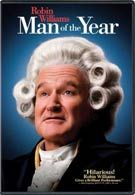Robin Williams plays political humorist-turned-politician in Man of The Year, director Barry Levinson’s picture that was conveniently released about a month before the 2006 mid-term elections. This is typically a perfect time for political commentary, when the American public screams frustration with their slim choice of candidates, none of whom ever seem to be quite the right fit for their vision. In this spirit, Tom Dobbs (Robin Williams), a cable network comedian working off the whimsy of an audience member that suggests he run for president, actually runs. The initial objective is capitalizing on popular disillusionment with cookie-cutter politicians, deficiencies in voting operations, and anger-turned-apathy for scripted political rhetoric. Offering an even less desirable candidate for the job, Man of The Year plunks down Robin Williams with a mean mockery of a system, and only half-baked ideals. “Could this man be our next president?” the movie’s tagline asks. Forget the implausibility of a Jon Stewart-type taking into serious consideration a run for the presidency, and not because he is not as articulate, socially aware, and responsible a citizen as (at least some) politicians—Dobbs is all of those things (and so is his real-life archetype Jon Stewart). The point the film makes is that it takes a sense of humor to get through the muddled and mud-slinging electoral process. Tom Dobbs interjects himself into the political sphere to point out its flaws. He wants us to know there are alternatives to the candidates we select, and that there are only half-truths behind their rhetorical sound bites.
To the detriment of Dobbs’s own message, he never specifies exactly how things have to change. He dances on stage ranting things like “I’m tired of the Republican party/I’m tired of the Democratic party,” as if it were his mantra. The resulting message is no clearer than that of the politicians’ he says he is “tired of.” At the end of the day Dobbs is soaked in the same political rhetoric he denounces.
The story moves at a distractedly fast pace. By the halfway point, Dobbs has been elected and is already on a downward spiral, mostly due to his involvement with his new computer whiz companion, Eleanor (Laura Linney), who finds a bug in the polling system that subsequently elects Dobbs in error. What was supposed to be an interesting look at how a non-politician would survive in the media-run electoral process never appears. Awkward “we have to talk” relationship-reconciling scenes between Dobbs and Eleanor replace political dialogue. With no political strategy Dobbs takes hold of an American public eager for change, but that is apparently too dumb to ask how he’ll get the job done.
This was supposed to be a movie to uplift the American voter and give them a sense of hope and humor, and to incite change in a system that the movie says has failed them. But this is a story of unformed (or misinformed) ideals, no better than even the worst candidate on the political market. The disc extras are slim. These are the obligatory-by-contract-through-the-studio disc features: a talk with the director and actors in “The Making of Man of The Year, and “Robin Williams: ‘Stand Up’ Guy,” which features the star performing improv comedy behind the scenes, exactly what he does best.
We’re at the point now where disc extras are part and parcel of any DVD release; “The Making of…” is standard fare for any movie, with the exception of certain directors (e.g. Woody Allen) who simply refuse to include them. It’s all in the name, “extras.” Supplemental material intended to expand our understanding of the picture. But Man of The Year, like many other DVD released films that left little or no impact on critics or the box office, can’t claim itself as “better” just because it’s on a new format. “Extras,” unfortunately, do not mean “new and improved.”

Rebel Moon - Part Two: The Scargiver Review: Zack Snyder’s Netflix Sequel Is An Adrenaline Rush That Partially Redeems Its Predecessor

Tracker's Justin Hartley Has A Sweet Message For Fans As Manifest's Melissa Roxburgh Joins The CBS Drama

As Law And Order: SVU Reveals First Look At Rollins' Return, I So Hope We Get Her Side Of Carisi's Story
Most Popular




